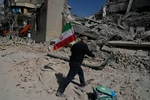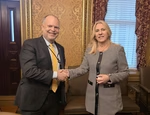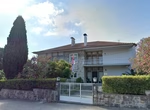
"Spies, priests, prosecutors and journalists; the innocent and the guilty alike are denounced as pro-Russian collaborators on Ukraine's online blacklist... Some of those on the 'Myrotvorets' database may have been involved in acts of propaganda or heinous war crimes in the country's east, but others have done nothing more than offend political or popular sensitivity, or simply use the 'wrong' vernacular'," The Times reported on Tuesday in an article about the infamous blacklist, which later also included Croatia's President, Zoran Milanovic.
“It matters not: one and all are judged by a hidden panel, accused of ‘deliberate acts against the national security of Ukraine’ and have their personal data published alongside their supposed crimes for all to see,” Croatia’s state agency Hina cited the article, penned by the newspaper’s correspondent from Kyiv, Anthony Loyd.
“As the threat of Russian invasion mounts, antagonizing political schisms and stoking invective within Ukraine, neither rank nor reputation exempts individuals from accusation by Myrotvorets,” Hina quoted the article as saying.
According to Hina, two days after the article was published, Croatian President Zoran Milanovic also ended up on it.
“He is accused of humanitarian aggression against Ukraine, of aiding the Russian aggression, disseminating Russian propaganda and supporting and justifying the Russian aggression against Ukraine,” Hina reported.
“Milanovic ended up on the list for saying that Croatia will not in any way get involved in the Ukraine crisis in case of its escalation and that it will not deploy its troops there. He has also said that Ukraine does not belong in NATO and that the European Union triggered a coup in Ukraine in 2014 when the pro-Russian president Viktor Yanukovych was ousted,” Hina explained.
In response, the Ukrainian Foreign Ministry on Wednesday summoned Croatia’s ambassador to Ukraine protest against Milanovic’s statements, which. “Meanwhile, his statements were applauded in Russia,” Hina said.
Milanovic’s inclusion on the Myrotvorets database blacklist was confirmed also by Russian Foreign Ministry spokesman Alexei Zaitsev at a regular press conference on Thursday. The list contains as many as 187,000 names, including not only war criminals and Russian FSB secret service agents but also Pink Floyd founder Roger Waters, who three years ago said Russia had more rights to Crimea than Ukraine.
Belarusian writer, Nobel Prize winner and Kremlin critic Svetlana Alexievich has ended up on the list for mentioning that some ethnic Ukrainians had helped Nazis in the persecution of Jews during World War II.
The list also includes 500 Ukrainian civil servants, ethnic Hungarians, who have obtained Hungarian passports. The reason – Ukraine prohibits dual citizenship, and Myrotvorets considers such an act an act of treason.
“The database was established in 2014 after a meeting of Ukrainian politician George Tuka and a former member of the Security Service of Ukraine (SBU), known only by his pseudonym Roman Zaitsev,” Hina said, citing The Times.
Tuka told The Times that former police officers, former soldiers and some political figures continued to have pro-Russian views and that lack of an official database with their names was the reason why Myrotvorets was created.
Several people were killed after their names and addresses ended up on the database. “Tuka claims there is no connection between that and the database but notes that those were enemies of Ukraine and that he does not miss them,” Hina said.
The list also includes data on around 4,500 Western, Ukrainian, and Russian journalists accredited by the separatist authorities of Donbas, a mandatory requirement for working in the area controlled by pro-Russian forces. Many of them later received threats.
“The list is very dangerous and should be removed immediately. The tension is already high and it only adds fuel to the fire,” former Human Rights Watch official in Ukraine Yulia Gorbunova said. The removal of the list has been requested a number of times by the UN, G7 and EU ambassadors and human rights groups, but to no avail, Hina said.
Kakvo je tvoje mišljenje o ovome?
Učestvuj u diskusiji ili pročitaj komentare





 Srbija
Srbija
 Hrvatska
Hrvatska
 Slovenija
Slovenija



























































